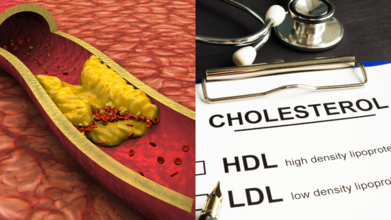- Health Conditions A-Z
- Health & Wellness
- Nutrition
- Fitness
- Health News
- Ayurveda
- Videos
- Medicine A-Z
- Parenting
- Web Stories
Why Do So Many Men Avoid Fertility Testing?

Credits: Canva
Conversations around reproductive health are becoming more inclusive—but one significant voice often remains absent: men. Despite data showing that 10% to 15% of men face infertility challenges, male fertility remains shrouded in silence, stigma, and emotional discomfort.
While society has made progress in encouraging men to speak up about mental health and emotional well-being, fertility seems to be the last frontier. Many still perceive it as a “woman’s issue,” even though science tells us otherwise. According to fertility specialist Dr. Mohammed Ashraf C, Scientific Director and Head of Embryology, “There’s a common belief that fertility issues are only a woman’s problem, and that men can’t be affected. For some, the ability to father a child is seen as proof of their manhood.”
From an early age, men are conditioned to associate virility with masculinity. The idea of being able to conceive a child is often treated as a validation of manhood. In many cultures, the role of a man as a father—especially a biological father—is deeply ingrained. This cultural narrative fuels the reluctance to even consider the possibility of infertility.
“Men don’t see a doctor unless something is bleeding or broken,” says Dr. Ashraf, summarizing a mindset that perfectly captures the aversion to proactive reproductive check-ups. Many men simply don’t want to know if something is wrong. Fear of judgment, feelings of shame, and ego can often be stronger than the desire to seek solutions.
Unlike women—who often openly discuss their fertility journeys—men rarely share their struggles. Infertility can lead to a cascade of emotional consequences for men, including isolation, low self-esteem, depression, and relationship stress. “Struggling with infertility and not feeling able to talk about it can lead to men feeling isolated and emotionally disconnected,” Dr. Ashraf notes.
Fertility concerns can even strain intimate relationships. Poor communication between partners can increase stress and impair sexual function, further compounding the issue. Emotional support for both partners is critical, and shared understanding can make the journey less painful.
How is Male Fertility Tested?
One of the biggest deterrents to male fertility testing is misinformation. Many men assume the process is invasive, complicated, or humiliating. In truth, male fertility tests are as routine as checking your blood pressure or cholesterol.
The process typically begins with a sperm analysis and a full reproductive health assessment, including medical history, previous infections, and lifestyle choices. “New sperm are produced every 3 months, so lifestyle changes can dramatically improve sperm health and increase the chances of conception,” says Dr. Ashraf.
This makes testing not only important for conception, but also for long-term health. In fact, male fertility tests can reveal issues like low testosterone or other treatable hormonal imbalances. However, it’s critical to approach treatment cautiously—starting testosterone therapy, for instance, can reduce or halt sperm production. That’s why fertility assessments should always come before any hormone interventions.
Sperm health is more than just a fertility indicator—it’s a window into a man’s overall well-being. Factors like diet, exercise, smoking, alcohol consumption, and age all impact sperm quality. These same factors are also linked to broader chronic health conditions, making sperm health an essential piece of the preventive care puzzle.
According to Dr. Ashraf, “It’s time to break the stigma, talk openly, let go of the shame, and stop thinking fertility is just a women’s issue. Taking that first step doesn’t make you less of a man—it shows you care about your health, your partner, and your future.”
The rise of at-home fertility testing kits is helping more men take that first step discreetly. These innovative tools are user-friendly, private, and can provide quick insights into sperm health—making it easier to move forward with further medical consultations if needed.
Couples facing conception challenges should remember that both partners share equal responsibility in creating a healthy embryo. Open dialogue, mutual support, and equal medical evaluations can help not only in conception but also in strengthening relationships during an emotionally taxing time.
Fertility challenges are not a reflection of masculinity. They are a medical issue—common, treatable, and often preventable. Ignoring the problem does not make it go away. Seeking help is not weakness. It’s empowerment.
Dr Mohammed Ashraf C is an Fertility specialist, Scientific Director, Head of Embryology at Milann Fertility Hospital, Bengaluru in India
Is Your Daily Routine Silently Raising Your Cholesterol? Here is How to Lower It

Credits: Canva
You cannot see it, feel it, or hear it increasing, but cholesterol might be quietly present in your bloodstream, creating trouble for your heart. Your everyday habits, like late-night scrolling, snack-bingeing, or skipping workouts, could be some of the reasons.
Experts warn that ignoring cholesterol is not a wise idea. “High cholesterol is not always easy to spot, and your everyday habits could be quietly leading to it. Making small, steady changes can really help your heart stay healthy,” explains Dr Vikas Vashisth, MD, Internal Medicine, SilverStreak Multispeciality Hospital.
We turn to experts to know what causes bad cholesterol and, more importantly, how you can lower it.
Rethink Your Fats
Fried food might taste divine, but they are not doing your heart any favours. Foods high in saturated fats, like red meat and full-fat dairy, increase LDL (the “bad” cholesterol). Trans fats, lurking in packaged snacks and baked goodies, are equally problematic.
“Go for healthier fats instead,” advises Dr Vashisth. Like olive oil for your cooking, a handful of nuts for your 4 pm cravings, or avocado on toast.
Increase Fibre Intake
If there is one thing that helps fight cholesterol, it is soluble fibre. Found in foods like oatmeal, apples, pears, kidney beans, and even Brussels sprouts, fibre acts like a sponge, soaking up cholesterol and flushing it out.
“Try to get 5 to 10 grams of soluble fibre every day to lower LDL cholesterol,” says Dr Vashisth. And no, that does not mean buying ‘fibre-rich’ biscuits; stick to whole, natural foods.
Sweat It Out
HDL is the “good” cholesterol that protects your heart. Exercise boosts HDL while lowering LDL, making it a double win. “Aim for at least 30 minutes of moderate activity most days,” suggests Dr Vashisth. Brisk walks, cycling, swimming, or even a dance session in your living room can do the trick.
Pick Heart-Healthy Foods
Food can be medicine if chosen wisely. Omega-3 fatty acids found in salmon, mackerel, walnuts, and flaxseeds help lower triglycerides and blood pressure. You can also try plant sterols or stanols (often in fortified foods) that block cholesterol absorption. Consider them little bodyguards in your kitchen.
Keep an Eye on the Scales
Carrying extra weight does not just sit on your waistline; it affects your cholesterol, too. “Even small changes in weight can have a positive impact,” says Dr Vashisth. Balance your meals, cut back on sugar-loaded snacks, and stick to consistent movement. Think of it as housekeeping for your health.
Why Indians Need to Pay Extra Attention
Most people imagine cholesterol to be a “Western problem”. But Indians are at higher risk of heart disease at younger ages. “We develop heart disease earlier due to a distinctive pattern of dyslipidaemia—high triglycerides and small, dense LDL particles,” warns Dr Honey Sharma, Consultant, Interventional Cardiology, Shalby Hospital.
On top of that, some people have genetically high cholesterol, making monitoring all the more vital. Dr Sharma stresses that guidelines by the Cardiological Society of India recommend stricter cholesterol targets than Western populations.
Habits That Raise Cholesterol
Not all cholesterol triggers are obvious. According to Dr Sharma, your everyday choices might be the stealthy culprits:
- Poor Sleep: Burning the midnight oil raises cortisol, which spikes cholesterol. Target at least 7 hours of shut-eye.
- Inactivity: Long hours at the desk lower HDL. Stand, stretch, or walk every hour.
- Chronic Stress: Stress pushes your liver to churn out cholesterol. Counter it with yoga, journaling, or short breaks.
- Sugar Overload: Beware of “low-fat” snacks that hide sugar. They raise triglycerides. Instead, choose fruit, nuts, or homemade curd.
Simple Fixes That Actually Work
You do not need a total lifestyle makeover. Start with tiny swaps:
- Eat more greens, legumes, and fruits.
- Walk, cycle, or dance daily.
- Replace stress scrolling with music, meditation, or journaling.
- Snack smart: pick seeds, roasted chickpeas, or fresh fruit.
What Is Frontotemporal Dementia That Psychologists Claim Donald Trump Is Exhibiting Signs Of?

Credits: realdonaldtrump/Instagram, Canva
Donald Trump’s health has once again become a hot talking point, but this time it is not about his diet or late-night Twitter habits. Instead, two psychologists are raising red flags about something far more serious: dementia. According to them, the US president has been showing what they describe as a “dead ringer telltale sign” of frontotemporal dementia (FTD) and they warn that the symptoms appear to be getting “worse and worse”.
The psychologists’ concern
Clinical psychologists Dr. Harry Segal and Dr. John Gartner, hosts of the podcast Shrinking Trump, claim that Trump’s psychomotor functioning has visibly deteriorated. Speaking to The Guardian, Dr. Gartner said, “Some of the more evidence that we've been talking about recently has been his psychomotor performance, that we're seeing a deterioration in his motor performance, which also goes with dementia because with dementia there's a deterioration of all faculties, all functions.”
Adding to the intrigue, the Mirror reported that Trump has been spotted “frantically” trying to hide the back of his hand, fuelling speculation about his health. According to Dr. Gartner, Trump’s verbal slips, struggles with language, and now motor difficulties fit the pattern of a neurodegenerative disorder. He even suggested Trump may have more than one form of dementia, but he believes one stands out: frontotemporal dementia.
“One of the things that one of the neuropsychologists that we were working with last year pointed out that is almost a dead ringer telltale sign of frontotemporal dementia is something they call a wide-based gait, where you have a sort of one of your limbs, one of your legs, and you kind of swing it in a semicircle,” Dr. Gartner explained.
What exactly is frontotemporal dementia?
Frontotemporal dementia (FTD) is not a single disease but a group of disorders that attack the brain’s frontal and temporal lobes. These regions control personality, social behaviour, and language, the very things that often change first in people with the condition.
Unlike Alzheimer’s disease, which is better known, FTD often shows up earlier, typically between the ages of 40 and 65. However, it can appear later in life, making it tricky to diagnose. Many patients are first misdiagnosed with psychiatric conditions or even Alzheimer’s because the symptoms overlap.
Symptoms that raise eyebrows
The Mayo Clinic states that the symptoms of FTD vary depending on the most affected part of the brain. The progression is gradual but relentless.
Behavioural symptoms include:
- Socially inappropriate behaviour.
- Loss of empathy and sensitivity to others.
- Poor judgement and impulsivity.
- Apathy that can be mistaken for depression.
- Compulsive habits such as tapping, clapping, or repetitive lip-smacking.
- Decline in hygiene.
- Odd eating habits – from sudden sugar cravings to chewing on non-food items.
Language-related symptoms include:
- Trouble understanding and producing speech.
- Difficulty finding the right words.
- Using vague terms like “it” instead of specific words.
- Simplified, telegraphic speech.
- Errors in building sentences.
Movement-related symptoms (less common but significant) include:
- Tremors, stiffness, or muscle spasms.
- Difficulty swallowing or weakness.
- Poor balance leading to falls.
- Inappropriate emotional outbursts like laughing or crying.
The “wide-based gait” noted by Dr. Gartner falls into this movement-related cluster, aligning with the suspicion of FTD.
What causes it?
FTD literally shrinks the brain; the frontal and temporal lobes undergo atrophy while abnormal proteins accumulate. The precise cause is not always clear, but genetics plays a role in some cases. Mutations in certain genes overlap with conditions like ALS (amyotrophic lateral sclerosis), hinting at a deeper biological link that scientists are still trying to untangle.
Interestingly, over half of people diagnosed with FTD have no family history of dementia, meaning the condition can strike seemingly out of the blue.
Who is at risk?
The only established risk factor is family history. Unlike heart disease or type 2 diabetes, lifestyle choices have not been clearly tied to developing FTD. Still, because it often appears earlier than Alzheimer’s, it can be devastating for families, robbing individuals of their personality, judgement, and communication skills during what should be the prime of life.
While Trump’s team has not confirmed or denied any health concerns, the observations of Dr. Segal and Dr. Gartner point to a broader issue: recognising the early signs of dementia in public figures and ordinary people alike. If the psychologists are correct, the president may be experiencing symptoms that fit squarely within the profile of frontotemporal dementia.
What is Bruce Willis's health update? He was also diagnosed with FTD over three years ago
Bruce Willis Health Update: Besides Trump's news, there is an update on Bruce Willis's health. At the preview of ABC's special Emma & Bruce Willis: The Unexpected Journey, Willis' wife Emma opened up about her husband's battle with frontotemporal dementia, saying his “brain is failing him” and his “language is going.” Despite the heartbreaking progression of the disease, she says their family has found new ways of communicating and cherishes the rare moments when his true personality shines through.
The 70-year-old “Die Hard” and “Sixth Sense” star was diagnosed with frontotemporal dementia more than three years ago. In 2023, his family revealed the condition.
You Will Be Surprised: THIS Chronic Condition Could Be the Hidden Reason You Cannot Conceive

Credits: Canva
When couples struggle to conceive, they usually think of hormone imbalances, advancing age, or lifestyle problems. But did you ever imagine that the real hindrance could be something as silent as chronic inflammation? It does not make headlines like PCOS or low sperm count, yet it silently disrupts the reproductive system in both men and women. And yes, it could be standing between you and your dream of parenthood.
Inflammation is More Than Just Swelling
Dr. Rupali Tambe, Fertility Specialist at Nova IVF Fertility, Lullanagar, explains that chronic inflammation is increasingly being linked to infertility. “Some conditions, such as infections, endometriosis, and polycystic ovary syndrome (PCOS), are marked by inflammation. This can impact the uterus and cervix, ultimately reducing the chances of conception,” she says.
Inflammation is like the body’s fire alarm. It is helpful when you have hurt yourself or caught an infection. But when the alarm does not switch off, the body is stuck in a low-level state of stress, which can interfere with ovulation, sperm production, and even implantation.
The Science of Why It Affects Fertility
According to Dr. Mandavi Rai, Senior Fertility and IVF Specialist at Motherhood Fertility & IVF, Noida, the trouble goes deeper than you think. “Chronic inflammation due to conditions like PCOS, autoimmune diseases, poor diet, or stress can impact the ovaries, fallopian tubes, and uterus in women. In men, it damages sperm production, count, and motility,” she points out.
For women, this could mean poor egg quality, scarring of the fallopian tubes due to pelvic inflammatory disease or endometriosis, or hormonal imbalances that block ovulation. For men, issues like orchitis (testicular inflammation) or varicocele (enlarged veins in the scrotum) can heat things up. Higher testicular temperature disrupts sperm formation, leaving fewer healthy swimmers.
Can Diet Calm the Fire?
You do not have to live with inflammation forever. Dr. Tambe says that studies suggest an anti-inflammatory diet may boost pregnancy rates in women and even improve sperm quality in men.
An anti-inflammatory diet would include foods like salmon, walnuts, flaxseeds, berries, mushrooms, leafy greens, tomatoes, yoghurt, and even kimchi. Avocados, turmeric, ginger, kale, and green tea also make the cut. These foods are packed with antioxidants and healthy fats that cool inflammation naturally.
And Dr. Tambe advises skipping processed, fried, and sugary foods. That means saying no to French fries, pizzas, pastries, namkeens (salty mixtures), and fizzy drinks. Basically, if it comes in a packet or is dripping with oil, it is not doing your fertility any favours.
Beyond Food Choices
Food is not the only reason here. Dr. Rai stresses that daily exercise, quitting smoking and alcohol, and maintaining a healthy weight are essential. “Regular activities like swimming, cycling, or yoga reduce inflammation markers in the body and improve reproductive health,” she says.
Do not forget stress. Chronic stress itself is a proven inflammation trigger. Meditation, deep breathing, or just unplugging from your phone for an hour a day can help quiet your nervous system. And yes, quality sleep, at least 7 to 8 hours, acts as nature’s best anti-inflammatory pill.
When Lifestyle Changes Aren’t Enough
Sometimes, lifestyle fixes and diets cannot tackle severe inflammation. That is when medical interventions step in. Non-steroidal anti-inflammatory drugs (NSAIDs), antibiotics (for infections), or hormonal treatments may be prescribed by specialists.
For couples facing stubborn infertility, assisted reproductive technologies (ART) like IVF or ICSI can provide hope. “Women with infertility who followed an anti-inflammatory diet during IVF had better pregnancy outcomes compared to those who didn’t,” Dr. Tambe says.
Infertility is rarely caused by a single factor, but chronic inflammation is an under-recognised condition. The right mix of an anti-inflammatory diet, lifestyle changes, and expert care can make all the difference.
© 2024 Bennett, Coleman & Company Limited

